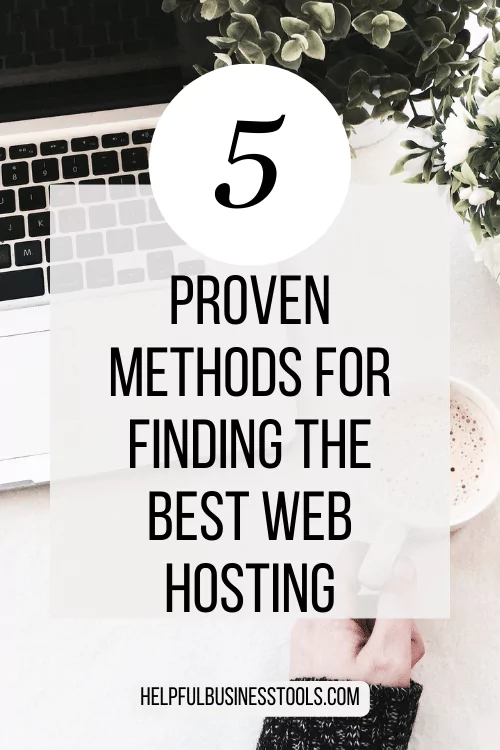This post contains affiliate links. We may receive a commission if you use these links.

Starting a new business involves making numerous decisions, and one of the most crucial choices you’ll face is selecting the best web hosting company. With a plethora of options available, finding the best web hosting company for your needs may seem daunting. To ease this process, here are the top five considerations for choosing the best web hosting provider.
What is Web Hosting?
Web hosting is a service that allows individuals and organizations to make their websites accessible via the World Wide Web. It involves storing website files on a server, which is connected to the internet, enabling visitors to access the site anytime, anywhere. Check out our comprehensive guide on web hosting for more information.
How to Find The Best Web Hosting Provider
1. Understand Your Web Hosting Needs
Before diving into the sea of web hosting options, it’s essential to understand your specific requirements. Consider factors such as the type of website you’re building, the expected traffic volume, cost, and any special features your website might need. For instance, if you plan on running an e-commerce site, you’ll need hosting that can handle secure online transactions. Understanding your hosting needs will guide you in choosing a provider that aligns with your business goals.
2. Evaluate Web Hosting Types
Web hosting comes in various types, each catering to different needs. The three main types are shared hosting, VPS (Virtual Private Server) hosting, and dedicated hosting.
Shared Hosting
Shared hosting is a cost-effective option where your website shares server resources with other sites. It’s suitable for small businesses or startups with moderate traffic. However, if your website experiences rapid growth, shared hosting may become limiting.
VPS Hosting
VPS hosting provides a virtual dedicated server within a larger physical server. It offers more customization and control compared to shared hosting. VPS is a good choice for businesses that need scalability without the cost of dedicated hosting. Amazon Lightsail would be a great option for this.
Dedicated Hosting
Dedicated hosting provides an entire physical server dedicated to your website. It’s ideal for large businesses with high-traffic and resource-intensive websites. While it offers unparalleled performance, dedicated hosting comes at a higher cost.
Understanding the pros and cons of each hosting type will help you make an informed decision based on your business’s current and future needs.
Here are 3 Best Web Hosting Companies to consider. You can find the full guide from our Top 10 Best Web Hosting Providers
- Hostinger
- Cost-effective plans – Hostinger offers very affordable shared hosting plans starting at just a few dollars per month. This makes them a great option for personal sites or new businesses on a budget.
- Easy to use control panel – The Hostinger control panel has an intuitive interface that makes it easy for beginners to manage their hosting account, files, and installations.
- Scalable resources – Hostinger’s cloud infrastructure allows you to easily scale up your hosting resources like bandwidth, storage space, and CPU power as your site grows. This flexibility helps prevent slowdowns.
- SiteGround:
- Fast performance – SiteGround offers excellent page load speeds and minimal downtime due to its robust infrastructure and advanced caching technologies.
- WordPress expertise – SiteGround provides optimized WordPress hosting plans with advanced caching, staging tools, and one-click installs to make running WordPress sites fast and easy.
- Helpful support – SiteGround has 24/7 customer support available by phone, chat, and tickets to help troubleshoot any hosting issues. Their technical staff is knowledgeable and responsive.
- HostGator:
- Reliable uptime – HostGator utilizes high-quality hardware and networks to provide consistently reliable uptime and performance. Their servers have redundant power and connectivity.
- Easy WordPress management – HostGator’s cPanel includes one-click WordPress installation, automated WordPress backups, and seamless WordPress staging, cloning, and migration.
- Excellent support – HostGator offers 24/7/365 phone, live chat, and email support from knowledgeable technicians to help you quickly troubleshoot any hosting issues.
3. Consider Reliability and Uptime
Reliability and uptime are crucial factors for any website. Choose a web hosting company that guarantees a high level of uptime. A reliable host ensures that your website is accessible to visitors consistently. Look for providers that offer at least 99.9% uptime, and check customer reviews to verify their claims.
4. Prioritize Security Features
In an era of increasing cyber threats, the security of your website should be a top priority. Assess the security features provided by the hosting company. Look for features such as SSL certificates, firewalls, regular backups, and malware detection. A secure hosting environment not only protects your business data but also instills trust in your visitors.
5. Evaluate Customer Support
Responsive and reliable customer support is indispensable when dealing with website-related issues. Before finalizing your choice, assess the hosting company’s customer support options. Check if they offer 24/7 support through live chat, email, or phone. Additionally, read customer reviews to gauge the experiences of other users in dealing with the support team.
Conclusion
In conclusion, choosing the best web hosting company is a critical decision that can significantly impact your business’s online presence. By understanding your hosting needs, evaluating different hosting types, prioritizing reliability and uptime, considering security features, and assessing customer support, you can make an informed choice that aligns with your business goals. Take the time to research and compare options to ensure a seamless and successful hosting experience for your new business.

